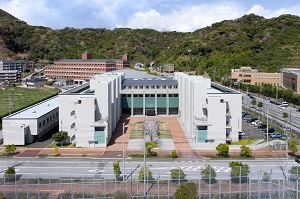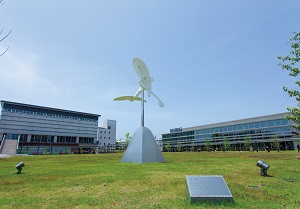本文
Policies ~Graduate School of Human Life Sciences~
The Graduate School of Human Life Sciences develops high-level professionals who aim to foster the cultural development of communities and healthy, comfortable living environments, through a compound approach to teaching and researching human lifestyle, thereby taking a comprehensive perspective to resolve and adjust lifestyle issues of local communities.
Admission Policy
The Master's Program aims to produce personnel capable of tackling lifestyle problems in communities from a comprehensive perspective based on education and research rooted in human life studies. The Master's Program, therefore, seeks individuals with the following qualities.
1. An interest in various issues related to human life and communities, and a strong sense of purpose and an exploratory mind to investigate and resolve those issues
2. Strong enthusiasm for tackling the issues actively, aspirations to learn proactively, and a strong will to accomplish these endeavors
3. Foundational knowledge and flexible thinking skills in the area of specialization
4. A humanistic mindset rich in collaboration, coordination, and rapport, to design and implement the systematization of communities in terms of nutrition, life, social welfare, and culture
Selection Policy
There are three categories for admissions to the Master's Program: “General,” “Working adults,” and “Overseas.” The basic policy of selection is as follows.
General
This category is for individuals who have graduated from a university or who are expected to graduate from a university during that academic year. Selection is conducted through the following methods.
1. Written test
This requires the applicant to write an essay on a given subject, which will be evaluated in terms of the degree to which he/she understood the question(s) presented and the appropriateness of the answer(s) to the question(s), the relevance of the answer(s) to the expertise he/she wants to develop, and the ability to compose written statements to state ideas.
2. Interview
Applicants give a presentation, which is followed by questions and answers based on the Research Plan, to examine suitability for the program and basic abilities to conduct research.
The suitability of applicants for the program is judged in accordance with the following criteria, of which at least one must apply.
- The applicant wants to contribute to solving problems in communities.
- The applicant wants to acquire a high level of professional competence.
- The applicant wants to make effective use of specialized knowledge and experience in the areas of specialization to solve the problems.
The applicant’s fundamental abilities to conduct research activities are evaluated with respect to the following.
- The applicant has a clear understanding of his/her research proposal (purpose, method, and expected results) and the notable characteristics of his/her research (novelty and originality).
- The applicant has fundamental knowledge of the specialization.
Working Adults
This category is for individuals who have graduated from a university, and have experience working at a company, a governmental agency, an educational institution, a research institution, or other types of organizations, or those who have participated in societal activities. Applicants must submit a letter of recommendation issued by another individual who knows the applicant well and has a clear understanding of the research theme. Selection is conducted through the following methods.
1. Presentation
The applicant gives a presentation. This is followed by questions and answers based on the Statement for Application to examine the reasons for his/her application, the activities he/she wants to conduct, and his/her enthusiasm and attitudes.
2. Interview
The interview involves questions and answers centered on the Research Proposal to examine what the applicant wants to learn in the program, the level of his/her professional orientation, the appropriateness of the content of his/her research proposal, his/her fundamental expertise in the area of specialization, and his/her plan for studies, etc., after enrollment. For eligibility for application to this category, the applicant must participate in one of the Graduate School Admission Briefing Sessions held several times per year and have a preliminary interview with a faculty representative after the session.
Applicants with Foreign Status
This category is for individuals who have graduated from a university, and who have neither Japanese citizenship nor permanent resident status in Japan, or those who have passed the Japanese Language Proficiency Test (N2 or 2). Selection is conducted through the following methods.
1. Presentation
The applicant gives a presentation. This is followed by questions and answers based on the Statement for Application to examine the reasons for his/her application, the activities he/she wants to conduct, and his/her enthusiasm and attitudes. The applicant’s proficiency in spoken Japanese communication is also examined.
2. Interview
The interview involves questions and answers centered on the Research Proposal to examine what the applicant wants to learn in the program, the level of his/her professional orientation, the appropriateness of the content of his/her research proposal, his/her fundamental expertise in the area of specialization, and his/her plan for studies, etc., after enrollment.
Curriculum Policy
The Master's Program aims to foster students' ability as highly specialized professionals to accommodate and solve problems faced by local communities. The curriculum of the program is organized as follows.
1. Common Policy
(Structure and content)
1) The curriculum is composed of two parts: Foundational Studies and Specialized Studies. The latter part is further divided into three areas of study: Nutrition and Human Life Studies, Social Welfare Studies, and Cultural Studies. Each area of study has a Research Tutorial Seminar to foster the student's expertise, in order to form and advance his/her own research endeavors from a comprehensive perspective.
2) The area of Nutrition and Human Life Studies consists of three course sets: Food Science, Human Nutrition, and Human Life Studies.
3) The area of Social Welfare consists of four course sets: Welfare Specialty Foundation, Regional and International Welfare, Care and Elderly Welfare, and Child Family Welfare.
4) The area of Cultural Studies consists of Comprehensive Studies on Human Culture, Japanese Culture Studies, and English Language and Culture.
5) The Program for Teacher's License in School Education (Nutrition) consists of Food Science, Human Nutrition, and Nutrition and Life Studies.
6) The Program for Teacher's License in School Education (English) consists of English Language and International Cultural Studies.
(Sequence)
7) Students take Research and Ethics (required) and choose one from among the courses Research Methodology I, Ii, and Iii (elective) in the first semester of their first year to acquire fundamental research abilities.
(Implementation)
8) Advisement on coursework is provided to students to enable them to acquire the abilities stipulated in the Master’s Program Diploma Policy, according to their area of interest.
9) Balanced use of lectures, seminars, and research tutorials enables students to acquire the abilities stipulated in the Master’s Program Diploma Policy. Students learn methods of studying independently through preview assignments, review assignments, group discussions, and active learning, etc.
10) As a rule, the Program offers courses on Saturdays and Sundays in accordance with the stipulations of the Special Provision of Article 14 of the Graduate School Establishment Standards.
(Evaluation)
11) Achievement goals, criteria, and methods for lectures and seminars, aligned with the Master’s Program Diploma Policy, are made known to students. Upon completion of the curriculum, evaluation is conducted through a dissertation review and final examination.
12) Students evaluate the curriculum and the Program strives to improve it in accordance with the results.
2. Curriculum Policy by area
(1) Nutrition and Human Life Science
As a requirement for completing the program of Nutrition and Human Life studies, students must obtain a total of 30 credits or more (6 credits from Fundamental studies, 18 credits from Specialized studies, 6 credits from Research Tutorial Seminars). They also must receive necessary research guidance and pass a dissertation defense and final examination.
(Sequence)
1) Students start taking courses in the first semester of their first year, mainly from Nutrition and Human Life studies, but also from Foundational studies and Social Welfare studies in order to acquire a wide range of academic knowledge covering multiple areas.
2) Students also start taking the Research Tutorial Seminar on Nutrition and Human Life in their first year in order to identify problems and issues for exploration and acquire the ability to clarify them, and to be guided to complete their master’s theses.
(Implementation)
3) In addition to the main and secondary advisors from the field of Nutrition and Human Life studies, faculty members from the other areas participate as advisors to provide research guidance from various perspectives. The advisors also hold a joint seminar once per semester.
(2) Social Welfare
As a requirement for completing the program of Social Welfare Studies, students must obtain a total of 30 credits or more (6 credits from Fundamental studies, 18 credits from Specialized Studies, 6 credits from Research Tutorial Seminars). They also must receive necessary research guidance and pass a dissertation defense and final examination.
(Sequence)
1) Students start taking courses in the first semester of their first year, mainly from Social Welfare studies, but also from Foundational studies and Nutrition and Human Life studies in order to acquire a wide range of academic knowledge covering multiple areas.
2) Students also start taking the Research Tutorial Seminar on Social Welfare in their first year in order to identify problems and issues for exploration and acquire the ability to clarify them, and to be guided to complete their master’s theses.
(Implementation)
3) In addition to the main and secondary advisors from the field of Social Welfare studies, faculty members from the other areas participate as advisors to provide research guidance from various perspectives. The advisors also hold a joint seminar once per semester.
(3) Cultural Studies
As a requirement for completing the program of Cultural studies, students must obtain a total of 30 credits or more (6 credits from the Fundamental studies, 18 credits from the Specialized studies, 6 credits from Research Tutorial Seminars). They also must receive necessary research guidance and pass a dissertation defense and final examination.
(Sequence)
1) Students start taking courses in the first semester of their first year, mainly from Cultural Studies, but also from Foundational studies, Nutrition and Human Life studies, and Social Welfare studies in order to acquire a wide range of academic knowledge covering multiple areas.
2) Students also start taking the Research Tutorial Seminar on Cultural Studies in their first year in order to identify problems and issues for exploration and acquire the ability to clarify them, and to be guided to complete their master’s theses.
(Implementation)
3) In addition to the main and secondary advisors from the field of Cultural studies, faculty members from the other areas participate as advisors to provide research guidance from various perspectives. The advisors also hold a joint seminar once per semester.
Diploma Policy
The Master’s Program aims to foster students’ ability as highly specialized professionals who can solve and rectify the lifestyle issues of local communities.
1. Common Diploma Policy
1) The student has the academic knowledge required to conduct research in his/her field of specialization.
2) The student has a wide range of in-depth academic knowledge covering his/her area of specialization as well as in other areas.
3) The student is able to identify research questions to be pursued in light of the characteristics of local communities.
4) The student is able to conduct research that sees the community as a system.
5) The student is able to draw conclusions, grasping the set research questions from a scientific perspective.
6) The student is able to share knowledge and skills obtained through research, by means of oral presentations and/or research papers.
7) The student is able to conduct his/her research independently.
8) The student is able to focus on practical research and share the findings with communities, as well as to contribute to the systematization of the discipline.
9) The student is able to conduct academic research activities with a clear understanding of and compliance with research ethics.
2. Diploma Policy by academic disciple
(1) Nutrition and Human Life Sciences
Students who satisfy the aforementioned common completion criteria as well as the following completion criteria are awarded a Master’s degree in Human Life Science.
1. The candidate is able to utilize his/her expertise in human life and nutrition studies to focus on aspects of human lifestyles.
2. The candidate is able to identify problems related to lifestyle and nutrition in local communities from the perspective of Social Welfare Studies and to verify concrete measures for solving those problems.
(2) Social Welfare Area
Students who satisfy the aforementioned common completion criteria as well as the following completion criteria are awarded a Master’s degree in Social Welfare Studies.
1. The candidate is able to focus professional knowledge and skills in the field of social welfare on issues concerning human lifestyles.
2. In addition to comprehending welfare issues in communities from a scientific perspective, the candidate is able to verify concrete measures to solve the issues from micro, meso, and macro perspectives.
(3) Cultural Studies
Students who satisfy the aforementioned common completion criteria as well as the following completion criteria are awarded a Master’s degree in Cultural Studies.
1. The candidate is able to focus his/her specialized knowledge and skills in cultural research on human lifestyles.
2. The candidate is able to verify his/her set research questions, using methodology from the humanities and social sciences.









